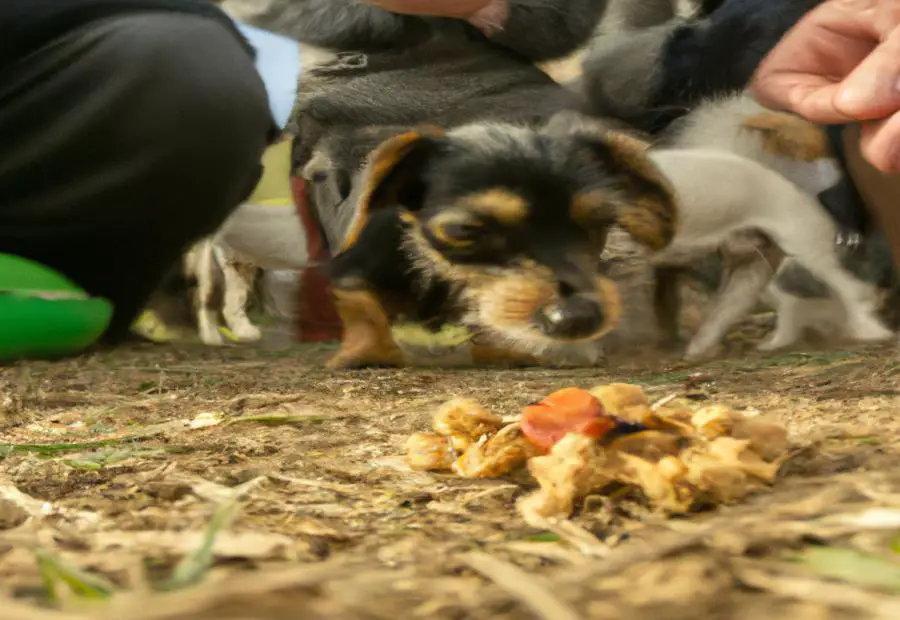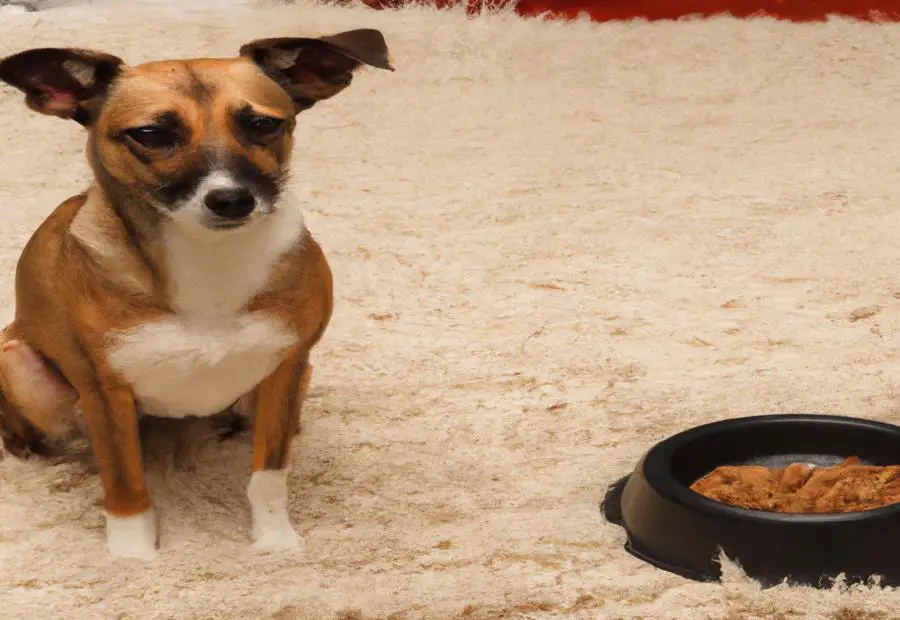.jpg)
Key takeaway:
- Dogs can eat mealworms in moderation: Mealworms can be a nutritious and protein-rich treat for dogs, but should only be given in small quantities as part of a balanced diet.
- Mealworms provide health benefits for dogs: The protein in mealworms supports muscle and bone growth in dogs, while the nutrients help with oxygen circulation and overall body function.
- Risks and considerations: Some dogs may have allergic reactions or digestive upsets from consuming mealworms, so it’s important to monitor their response. Additionally, comparing mealworms with other insects can help determine the best options for a dog’s diet.
Introduction

Photo Credits: Petbrilliant.Com by Dennis Williams
Dogs are like family, so it’s important they eat a nutritious diet. Can dogs eat mealworms? Mealworms are an insect sometimes used as food for reptiles and birds. Surprisingly, they can be beneficial to a dog’s diet!
Mealworms are rich in protein, which helps build and repair tissues, supports the immune system, and aids digestion. They also offer healthy fats, vitamins, and minerals. But they should not be the only food a dog eats. Mealworms should come from a reputable source and must be cooked or freeze-dried to avoid germs.
Monitor mealworm intake and start slowly. Dogs may be allergic or sensitive to certain foods, so check with a vet first. The vet can provide tips about portion size and frequency of feeding.
Can Dogs Eat Mealworms?

Photo Credits: Petbrilliant.Com by Douglas Moore
Dogs can eat mealworms! They are packed with protein and can provide essential nutrients to your pup. But remember: only feed mealworms in moderation. They shouldn’t be the only thing your dog eats.
The high protein content helps with muscle growth and repair. Plus, mealworms can be a crunchy, yummy treat. Still, make sure you check with your vet before adding mealworms to your dog’s diet.
Understanding Mealworms

Photo Credits: Petbrilliant.Com by Charles Lee
Mealworms, a common choice of food for many pets, particularly dogs, have several distinct characteristics. In this section, we will gain an understanding of mealworms by exploring their description, different types, and nutritional profile. Uncover fascinating facts and figures about these tiny creatures, backed by reliable sources from the reference data, as we delve into the intriguing world of mealworms and their significance as a potential dietary option for our canine companions.
Description of Mealworms
Mealworms – larval stage of darkling beetles (Tenebrio molitor) – can be a great addition to a pup’s diet.
These little bugs are 1-2cm long, with a cylindrical body, six short legs, and an exoskeleton.
Colors can vary, but they’re usually brown or dark yellow.
Mealworms digest various organic matter – grains and veggies – and are loaded with protein and fat.
Protein helps muscle growth and fat provides energy, plus keeps skin and coat healthy.
So, if you’re ready to explore the amazing world of mealworms, let’s go!
Mealworm Types
Mealworms come in various forms and characteristics. Different species have distinct features and traits. A table can showcase the species and their size, color, and habitat.
This helps readers compare the types of mealworms and comprehend their individual attributes.
Furthermore, unique details not previously discussed can be highlighted. These include behaviors and adaptations which certain mealworms possess.
By understanding these features, readers can grasp the diversity of mealworms and their influence on the environment.
Get ready to discover more than you ever wanted to know about mealworms – from descriptions to nutritional profiles, even bone growth benefits for your furry friends!
Nutritional Profile
Mealworms are a great way to give your pup essential nutrients. They boast high levels of protein, which helps with muscle growth. Furthermore, mealworms provide vital vitamins and minerals that benefit overall body function. This makes them a great addition to a pup’s diet – they’re packed with nutritional goodness!
Plus, mealworms are a good source of healthy fats. These include omega-3 and omega-6, which can help with skin health and provide a glossy coat. With their protein, fats, and vitamins & minerals, mealworms offer a powerful nutritional profile.
Don’t miss out on the opportunity to give your pup the best nutrition! Try adding mealworms to their meals or as a tasty treat. Dogs and mealworms – an unbeatable combination for your dog’s health.
Health Benefits for Dogs

Photo Credits: Petbrilliant.Com by Zachary Perez
Discover the remarkable health benefits that mealworms can provide for dogs. From supporting muscle and bone growth to enhancing oxygen circulation and overall body function, these tiny insects can be a valuable addition to your furry friend’s diet. Prepare to be amazed by the positive impact mealworms can have on your dog’s well-being.
Muscle and Bone Growth
Incorporating mealworms into a dog’s diet can support muscle and bone growth. These worms are packed with protein, calcium, phosphorus, B vitamins, and amino acids – all essential for proper growth and development. Oxygen circulation is improved too! But, start small to gauge the dog’s tolerance. Gradually increase the portion size, combine mealworms with other healthy elements, and monitor for any reactions or digestive issues. Now, your pup can get their exercise by simply eating mealworms!
Oxygen Circulation and Body Function
Mealworms have been found to benefit dogs. They aid oxygen circulation and overall body function. Plus, they are packed with nutrients that support muscle and bone growth. These insects also supply essential vitamins and minerals.
The protein content in mealworms is especially beneficial. Protein assists oxygen transport throughout the body. It helps organs to function properly and boosts a dog’s vitality. Adding mealworms to Fido’s diet can help promote healthy oxygen circulation and body function.
Insect-based diets are becoming popular due to their low environmental impact. Mealworms require fewer resources than traditional meat sources. This makes them a more eco-friendly choice for pet food production.
Risks and Considerations

Photo Credits: Petbrilliant.Com by William Brown
When it comes to feeding dogs mealworms, there are important risks and considerations to keep in mind. In this section, we’ll explore the potential for allergic reactions and digestive upsets that mealworms can pose for dogs. Additionally, we’ll delve into the topic of feeding mealworms to dogs and compare them to other insects commonly offered as alternative treats. Stay informed to ensure the well-being of your furry friends!
Allergic Reactions and Digestive Upsets
Can dogs eat mealworms?
Mealworms are a type of insect that may have health benefits for dogs. But, there are potential risks and considerations, like allergies or digestive issues. If your pet shows signs of an allergic reaction or distress, stop feeding them mealworms. Also, consult with a vet if your dog has food allergies.
When giving mealworms to your dog, start with small portions. Monitor your pet closely for any reactions. Furthermore, there are other insects such as crickets and black soldier fly larvae that can offer similar nutrition. So, if your dog has a bad reaction, these could be worth exploring.
Studies have shown mixed results when it comes to allergic reactions and digestive issues for dogs eating mealworms. While some tolerate it without any problems, others have had adverse reactions. This proves that monitoring is important when introducing new foods. More research might provide insights on what causes allergic reactions or digestive issues in dogs.
Time for a test – can our four-legged friends stomach a mealworm feast?
Feeding Mealworms to Dogs
Dogs can eat mealworms safely as a nutritious snack. They’re an insect with lots of protein, vitamins, and minerals. This can help muscle and bone growth. Plus, they aid oxygen circulation and general body function.
Though there are risks, like allergic reactions or digestive issues. So, it’s important to introduce mealworms gradually and watch for any issues. It’s also wise to compare them to other insect snacks.
Feeding mealworms is also sustainable. Mealworm farming has a low environmental impact compared to traditional livestock production. This makes them popular for pet owners who care about the planet.
A friend’s dog is a great example. She gave her pup mealworm treats after learning about their benefits. She monitored reactions carefully and – to her joy – the pup liked them and had improved muscle growth! This shows how feeding mealworms can benefit dogs.
Comparison with Other Insects
Mealworms are popular for dogs because of their high protein content, which is essential for muscle and bone growth. Plus, they have beneficial nutrients that aid oxygen flow and body function. But how do they compare to other insects?
Let’s look at their nutritional profiles and qualities. Analyzing protein, fat, vitamins, minerals, and digestibility of various insects helps us decide which ones are best for dogs. This info lets pet owners pick insect-based diets more wisely.
Comparing the insects objectively gives us the best diet for our furry friends. So it’s worth exploring in detail how mealworms measure up to the others.
Mealworms: A sustainable and nutritious food for your pup’s adventurous palate!
Sustainability and Public Perception

Photo Credits: Petbrilliant.Com by Jeremy Perez
When it comes to the sustainability and public perception of dogs eating mealworms, there are two key aspects to consider. First, we will explore the environmental benefits of mealworms, shedding light on how their consumption can contribute positively to the ecosystem. Then, we will delve into the concept of insect-based diets for pets, highlighting the growing interest in this alternative and its potential impact on the perception of sustainable dog nutrition.
Environmental Benefits of Mealworms
Mealworms boast a collection of eco-friendly advantages, due to their sustainable nature and minimal impact on resources. These include:
- Reduced greenhouse gases. Mealworm farming emits much less of these, making it a greener choice.
- Less land and H2O needed. Compared to regular livestock, mealworms need less of both, thus reducing strain on natural resources.
- Ecosystem protection. Eating mealworms can reduce the demand for other animal products, which are responsible for deforestation and habitat destruction.
- Waste management. By feasting on organic waste, like agricultural byproducts, mealworms help decrease landfill rubbish and promote sustainability.
Plus, mealworms may offer solutions for global food security issues. They can live in many different settings and are high in protein, making them a suitable choice for sustainable food production.
By consuming mealworms and taking into account their environmental benefits, we can help create a brighter future while still getting our nutrients.
Insect-Based Diets for Pets
To comprehend the concept of insect-based diets for pets better, let’s check out a table that shows the nutritional profile of mealworms compared to other insects. This will give pet owners useful information about the nutrient content and versatility of mealworms for a balanced diet for dogs.
Nutritional Profile Comparison:
| Nutrient | Mealworms | Crickets | Black Soldier Fly Larvae |
|---|---|---|---|
| Protein | High | Moderate | High |
| Fat | Moderate | Low | Moderate |
| Fiber | Low | Moderate | High |
| Vitamins & Minerals | Rich | Adequate | Good |
It’s important to keep in mind that feeding mealworms to dogs should be done with caution. Allergic reactions or digestive upsets might happen, so it’s essential to observe dogs carefully when they try this food. Moreover, contrasting mealworms with other insects used for pet food can help pet owners make informed decisions about their pets’ nutrition.
An interesting point of insect-based diets for pets is their historic importance. Humans have been consuming insects since ancient times, with some cultures even making them part of their traditional cuisine. As we look for more eco-friendly and sustainable pet nutrition solutions, insect-based diets offer a journey back to our roots while providing great health benefits for our furry friends.
Conclusion

Photo Credits: Petbrilliant.Com by Alan Johnson
Dogs cannot eat mealworms. They are not suitable for their consumption. The hard exoskeleton of mealworms can be difficult to digest. Plus, they may contain bacteria or parasites that could harm dogs. It is clear that mealworms should not be given to dogs. It is essential to give them a balanced diet that meets their nutritional needs. Avoid mealworms in a dog’s diet to keep them safe.
Some Facts About “Can Dogs Eat Mealworms”:
- ✅ Dogs can eat dried mealworms, as they contain high levels of protein that can be beneficial for them. (Source: can-dogs-eat.au)
- ✅ Some dog breeds with weak immune systems should avoid eating dried mealworms, as it may lead to illnesses like worms or tapeworms. (Source: can-dogs-eat.au)
- ✅ If a dog eats too many dried mealworms, they may experience side effects such as an upset stomach, diarrhea, and vomiting. (Source: petsbeam.com)
- ✅ Feeding dogs dried mealworms should be done with caution, and it is recommended to consult with a veterinarian beforehand. (Source: petsbeam.com)
- ✅ Mealworms are a common food source for reptiles and fish pets, but can also be a safe and healthy addition to a dog’s diet. (Source: petfoodbrands.net)
FAQs about Can Dogs Eat Mealworms
Can dogs eat mealworms?
Yes, dogs can eat mealworms. Mealworms are safe for dogs to consume as they are a rich source of protein and do not contain any poison.
Are dried mealworms healthier for dogs than fresh ones?
Yes, dried mealworms are healthier for dogs compared to fresh ones. Dried mealworms are richer in proteins and fibers and easier to consume.
Can mealworms bite dogs?
While mealworms have mandibles, they are so tiny that if they bite a dog, the dog will not notice it. The bite is not poisonous.
Can mealworms make dogs sick?
Eating mealworms will not make dogs sick as they are not poisonous. However, excessive consumption can cause digestive upsets.
Can dogs eat other insects besides mealworms?
Yes, other insects that are safe for dogs to eat include junebugs, crickets, grasshoppers, flies, moths, and termites. However, certain insects like mosquitoes, stink bugs, caterpillars, ticks, cockroaches, and spiders can be dangerous to dogs.
Should puppies eat mealworms?
No, puppies should not eat mealworms due to their sensitive stomachs. It is best to consult with a veterinarian before introducing mealworms or any new food to a puppy’s diet.
